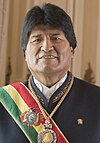Elizabeth Salguero
Elizabeth "Eli" Cristina Salguero Carrillo (born 1964, Argentina) is a politician in the Movement for Socialism – Political Instrument for the Sovereignty of the Peoples who served as the Minister of Cultures of Bolivia from February 2011 to January 2012. Salguero was elected as an alternate deputy for the 2010-2015 Plurinational Legislative Assembly. She was an unsuccessful candidate for mayor of La Paz in the April 2010 regional election.

Salguero was appointed Minister of Cultures on 16 February 2011, replacing folkloric singer Zulma Yugar. Salguero has pledged to focus on three priorities at the Ministry: extending interculturalism (interchange among Bolivia's various cultures) in the arts and culture; emphasizing overcoming patriarchy as part of the process of decolonization, and promoting tourism.[1][2] In March 2011 she nominated three Bolivian festivals to UNESCO for World Heritage recognition as part of the cultural and intangible heritage of humanity: the Ichapekene Fiesta of San Ignacio de Moxos, the Pujllay festival in Tarabuco (including the Ayarichi dance of the Yampara people), and the Alasita festival of La Paz.[3]
References
- ^ "Culturas define tres ejes para orientar su gestión". Los Tiempos. 2011-04-07. Retrieved 2011-04-07.
- ^ "Morales cambia a dos Ministras y repone Ministerio de Comunicación". La Jornada. La Paz. 2011-02-16. Retrieved 2011-02-16.
- ^ "Bolivia postula tres expresiones culturales como patrimonio inmaterial ante la Unesco". Los Tiempos. 2011-03-17. Retrieved 2011-04-07.

